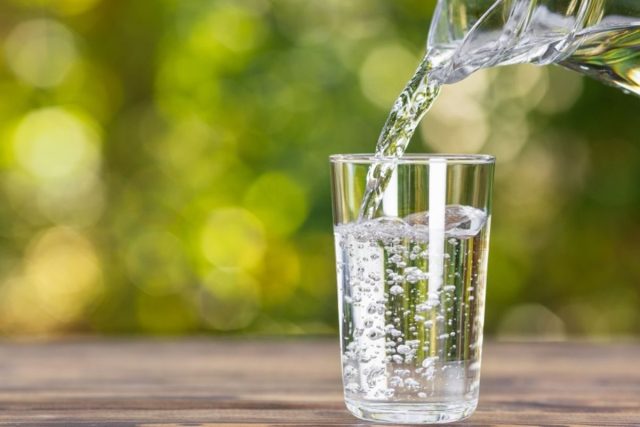The Dangerous Side Effects of Drinking Too Much Water, Expert Says

Summer never fails to be hot and steamy, and with plenty of planned beach activities, sports, rooftop happy hours, picnics in the park, and more outdoor fun on the calendar, it's important to stay hydrated. Not doing so can cause you to become dehydrated, and even being mildly dehydrated can create an extreme lack of energy and exhaustion. Your body requires a certain amount of water in order to function properly, especially when exerting yourself in the heat. You do need to drink up, but is drinking too much water each day actually a health risk?
We spoke to Dr. Mike Bohl, MD, MPH, ALM, Director of Medical Content & Education at Ro to find out the dangerous side effects of drinking too much water. Read on to learn more, and next, check out The 6 Best Exercises for Strong and Toned Arms in 2022, Trainer Says.
This is how much water you should drink each day

How much water do you need? Well, your body is made up of around 50% to 70% of water. Each organ, cell, and tissue in your body requires H2O, as it protects your tissues, helps you maintain a normal body temperature, and cushions and lubricates your joints. It also eliminates your waste when you perspire, urinate, and have bowel movements.
The right amount to drink each day, according to The U.S. National Academies of Sciences, Engineering, and Medicine is approximately 15.5 cups for men, and 11.5 cups for women. Are you drinking much more than that? If so, read on.
Related: Drink This Much Water Each Day To Prevent Heart Failure, New Study Says
Consuming too much water could wreak havoc on your kidneys

If you're drinking way more than the recommended daily requirement, be aware that you can potentially put your health at serious risk of developing "hyponatremia," also known as water intoxication. Although a healthy person would most likely not experience this, too much of anything is never a good thing. Overdoing it by consuming too much water can wreak havoc on your kidneys, making it really difficult to get rid of the excess water.
Dr. Bohl tells us, "When you drink extra water, it's first absorbed into your bloodstream, and then the extra water is filtered out by your kidneys and removed from the body as urine. So the upper limit of how much water the body can safely take in is about the same as the upper limit of how much water the kidneys can remove from the body." He adds, "For the typical, healthy adult, the kidneys can remove up to about 1 L of water per hour. As a result, drinking more than 1 L of water per hour for more than a couple of hours puts you at risk of having too much water in the body and experiencing side effects."
Related: 3 Quick Ways To Burn Calories Without "Exercising," Trainer Says
These are the symptoms of water intoxication

There are some symptoms to look out for that can indicate hyponatremia. Signs include vomiting, nausea, feeling confused, forgetfulness, and headaches, according to Insider. The condition should be addressed as soon as possible, or it can become more aggressive with hallucinations, seizures, slurring speech, feeling weak, cramped muscles, impaired functioning of your brain, and even a coma.
According to Dr. Bohl, water intoxication is more likely to happen to individuals who are doing extreme fitness and drinking a lot of water rather than refueling with electrolytes (aka a sports drink), participating in a water-drinking contest, or dealing with a mental health condition that "compels them—knowingly or unknowingly—to drink too much water."
For more…

For more mind and body news, check out Get Rid of a Pot Belly in Your 50s With This 10-Minute Workout, Trainer Says and The #1 Weight Training Workout To Reverse Aging After 40, Trainer Says.








